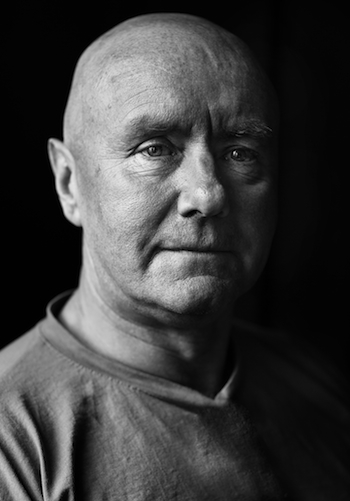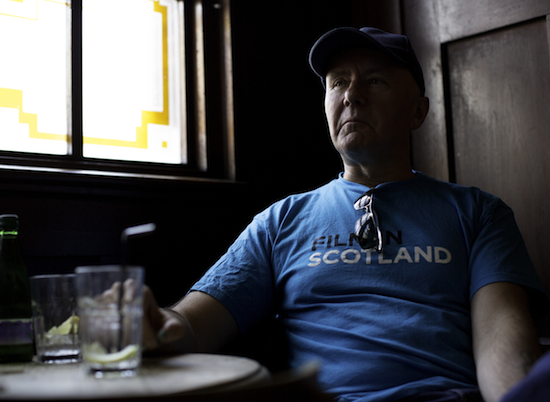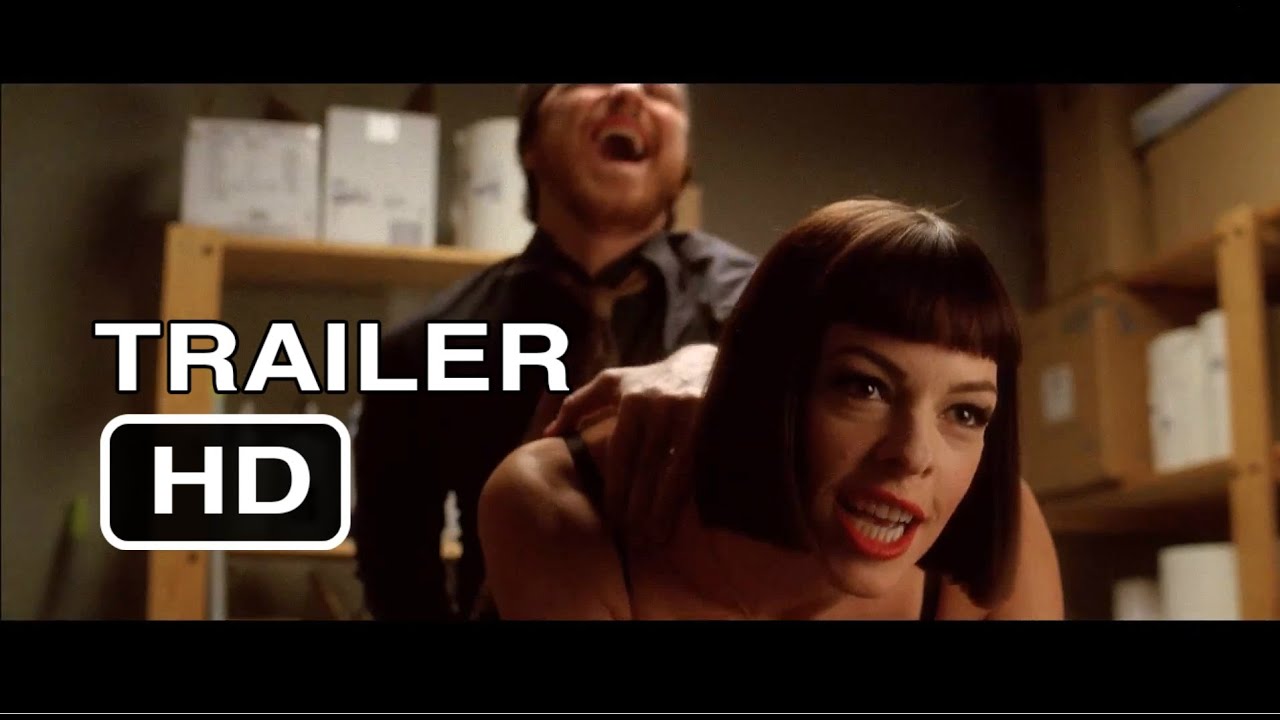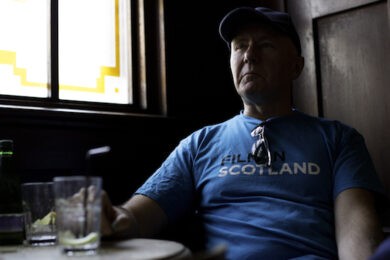Photographs taken for The Quietus by Phil Sharp
Looking back at the facts there wasn’t that much to dance about in 1993. Unemployment at a six-year high as NHS waiting lists grew to a million. UKIP was founded as the BNP won their first council seat in Tower Hamlets. Some enjoyed the sight of John Major tending the embers of Thatcher’s cabinet, but those who were shocked by the subsequent Conservative re-election still say, twenty years on, that economically and culturally the country never recovered from those years of Tory rule. In English literature, Martin Amis visited Mrs. Nabokov. In Ireland Roddy Doyle produced Paddy Clarke Ha Ha Ha. In Edinburgh, a year after excerpts appeared in the first issue of Scotland’s punk literary fanzine Rebel Inc, the 35-year-old Irvine Welsh published Trainspotting.
Two decades later, Welsh is as happy as you might expect. In 1996 the global success of Danny Boyle’s Trainspotting adaptation made stars of Ewan McGregor, Robert Carlyle and Johnny Lee Miller, establishing Welsh as the Scottish bad boy of abrasive, anti-establishment writing. Trainspotting was longlisted for the Booker but offended two judges, crystalizing the kind of kudos and fashion-mag credibility that led The Face to call Welsh ‘the poet laureate of the chemical generation.’ His books have since met with fluctuating levels of praise and disdain, but today he’s celebrating the successful adaptation of his 1998 novel Filth, directed by Jon S Baird and starring Jim Broadbent with James McAvoy.
The release date for Filth hasn’t yet been settled but plans to adapt Porno – known as ‘Trainspotting 2’ – are underway. Welsh, now living between Chicago and Miami, also hopes to build on the success of the bestselling Skagboys with an upcoming ‘lesbian noir’ set in the States. He’ll turn 55 later this year and drinks Highland Spring, coincidentally and appropriately but by no means exclusively. Like Trainspotting, the bottled water became one of the biggest Scottish exports of the mid-to-late 1990s. There are surface-level political parallels between then and now, but obvious differences too.
At the beginning of the year Welsh wrote an essay named <a href=” http://bellacaledonia.org.uk/2013/01/10/irvine-welsh-on-scottish-independence-and-british-unity/” target=”new”>Scottish Independence and British Unity, describing a childhood spent shuttling between Leith housing schemes and the morphing demographics of 1970s west London. Ahead of the 2014 referendum he says Scottish independence might actually pave the way for a kind of post-UK politics that will allow England to fulfill its main mission of building an ‘inclusive, post-imperial, multi racial society’. But before all that it’s time to talk dirty. Filth. And Porno. He must have loved Fifty Shades of Grey.
Irvine Welsh: Well yeah, Fifty Shades of Grey in some ways has made Porno redundant as we had originally conceived it, because the book was about the whole increase in Internet porn and Gonzo porn ten years ago, which was kind of relevant then. With Fifty Shades of Grey you can tell everything’s changed: Now it’s quite passé and no big deal to make pornographic films for the Internet and all that. So I’m trying to find another way in, script-wise, to pull these characters back together. We can have them making a porn film, but they’d have to be already in that game then find something else.
Have either Danny Boyle or Ewan McGregor committed to making Porno?
IW: Yeah, I mean they had the Trainspotting reunion – I wasn’t at it – at the Ciné Lumière and everybody was there, they were all on the same page and all kinda happy to go with it. So it has moved on, considerably. Yeah, it’s cooking on, now.
What did you make of Ecstasy, the film?
IW: I think it was a really good stab. It wasn’t my strongest book or my strongest material, but they wanted to make a kinda “rave culture” movie. I think it had a lot of good things in it, a lot of solid performances and it was cleverly put together. I think the flaws in it were obviously the accents, which irritated the fuck out of a lot of people because it’s Canadians trying to be Scots and it just sounds like Groundskeeper Willie. You can do one Groundskeeper Willie but you can’t do four. It’s kind of like me going into a pub and doing a John Wayne thing, but the barmaid talking back in exactly the same John Wayne accent. It starts to get a bit crazy.
So it had its flaws, but again it was shot on a low budget, and they did well. It’s not in the same league as Filth. I mean Filth is the best British film since Trainspotting. It might even be better. I keep watching it back to back with Trainspotting to try and work out which is the best. I can’t split them.
In Filth James McAvoy is a surprise. Reading the book you get the sense that Bruce is older, fatter, greasier…
IW: I couldn’t understand it myself. We were looking for someone who could get the film made at that kind of level, with the finance we wanted, and we spoke to a lot of people. When I met James in the Soho Hotel with Jon Baird, the director, he looked about ten years old. I thought there’s no way he’s going to be a forty-year-old divorced alcoholic cop. I thought, really lovely guy, I’ll let him and John talk and see if they get on.
I came downstairs and I saw John’s face. He was absolutely glowing. I couldn’t believe it. I sat down beside them and James turned round to me and he was like a totally different guy. Turned into this really fuckin’ evil fuckin’ sweaty bastard, right in front of John’s eyes, just got into character. He’d suddenly grown a five o’clock shadow, he had that really kinda nasty snidiness about him. I actually thought I could smell him.
I thought ‘how the fuck did he do that?’ Actors just do that, get right into character. I just got so excited, thought fucking hell, if this guy can do that, appear almost as I saw this guy in my mind’s eye as I was writing the book – and no actor’s been able to do that before – if he can do that without any rehearsal, make-up, costume… what’s he going to do when it comes time to actually prepare for the role? He was spectacular. So we just danced. James left, John and I just had a jig right across the lobby of the Soho Hotel.
Speaking of spectaculars, what’s your abiding memory of Danny Boyle’s Olympics opening ceremony?
IW: The nurses jumping around and doing the dances. Looking so cool and well choreographed. That’s the abiding visual image that I have of it.
Skipping across into related political territory, Margaret Thatcher died this year.
IW: The first of the Trainspotting crew to die. Out of the five of them like, Begbie, Renton, Spud, Sick Boy and Thatcher. Who’d have thunk she’d have been the first to go? She was the invisible author of the book, really. She created the conditions and the hubris whereby that whole culture flourished. She was the invisible hand behind it. Without that, there’d be no Trainspotting and no Filth.
And no Skagboys presumably, which opens with Renton at the Battle of Orgreave.
IW: No Skagboys. I should really have cut her in for some of these royalty cheques. The interesting thing about Thatcher was that she was on, when you think about it, she came to power in 1979, she kind of bowed out in 1990, so she had eleven years in power. Then she spent another 23 years as a kind of raving fucking lunatic vegetable before she died.
I remember, I was fucked out my box and we were coming out of Fabric, a bunch of us, and we decided we’d go to The Dorchester for breakfast because it’s the most expensive breakfast in London. We were all yeah, yeah, fucking most expensive – just out to annoy everybody. The four of us went there and Thatcher was at the next table. Just with her minders, and she fucking looked over. We thought, Thatcher! Let’s get ripped in about this and that… but we just looked, and felt sad.
She just looked out of it, absolutely miserable, looking into this paper, nobody around – just her minders. Lonely and fucked and defeated: This feeling of pity that I had for her really surprised me, but I was so glad that I had it because I knew she’d fucking hate that more than anything. It was quite life-affirming, for me, that I felt hat kind of pity for her, because I didn’t think I ever would.

Did you sympathize with the jubilant public celebrations, people celebrating her death?
IW: I didn’t. I thought this is a bit fucking sick, because the celebration of death is not a good thing. Fetishizing death isn’t a good thing. You should be celebrating life and enjoying it and all that. I just thought it was such a cathartic thing for so many people who’d suffered under her policies. I mean Cameron’s far worse – fucking Blair is worse – but she was the most kind of nakedly vicious. More honest and transparent than them. They’re these patronizing wankers who come out with all that PR smarm whilst they’re knifing everybody in the back. Whereas she was just like ‘You’re scum, I fucking hate you, you’re not part of it like, fuck off.’ She was the real jackboot stormtrooper of the Fourth Reich of The Rich.
But also, she was absolutely slaughtered by them when they decided that they’d had use of her. They just fucking knifed her in the back. It’s interesting – you had Osborne crying at her funeral. She would have been the first person, she would have read these tears as being as fake as the smiles of his predecessors when they knifed her in the back.
There’s a famed passage in Trainspotting saying ‘Ah don’t hate the English. They’re just wankers. We can’t even pick a decent, vibrant, healthy culture to be colonized by…’ How do you feel about England today?
IW: I’ve always felt really good about England. I’ve always felt really, really good about Britain. It’s the UK: We have to get beyond that imperialist state. I think that kind of imperialist, hierarchical, elitist state has made it easier to basically shaft everybody in the country, which it’s been doing for the last thirty years. It has also sort of made it more difficult for England to fulfill its destiny, which in my mind is creating a multi-ethnic, multicultural society that is truly at the head of that post-imperial commonwealth ideal. I think that that’s what England should be and that that’s the kind of nation we should be.
I think Scotland’s got its own issues, in some ways similar to Northern Ireland with sectarianism, which has been a long-running sore. All the issues of land ownership, development resources, poverty, alcoholism and violence, all these things.
Has the Conservative-led coalition overstayed its welcome in Scotland, Wales or Northern Ireland in terms of governance?
IW: I don’t think it had any welcome to overstay. I think of how many Scottish Conservative MPs there are. I don’t think there’s been any for a while.
One?
IW: One, I think. The thing with the Liberal Democrats, they had a little bit of support in Scotland but I think that’s been fucked now, by throwing their lot in with the Conservatives.
That raises the possibility that UKIP might become the third party by 2015. What do you make of “the rise of UKIP” and the associated BNP/EDL stuff happening in London?
IW: I think it’s quite understandable, in a lot of ways, because of the failure of the Left in Britain. People in the radical Left in Britain almost take this Marxist view, like ‘just let capitalism fuck itself – sit back and enjoy the show.’ I think you’ve got to do a bit more than that, because once things start to fall apart people look for a kind of strong authoritarian Government to sort things out. If there’s very strong civic unrest you can see a strong party of the Right emerging, whether it’s UKIP or an even further-right party. I think UKIP and the BNP are very, very English concerns. If they gather strength they’re going to add to this schism between Scotland and England.
The Scottish independence question: Do you think it’s covered adequately by the BBC and mainstream media?
IW: Nothing is covered adequately by the BBC. The BBC has become the biggest disappointment – they’re just so terrified. And in a way it’s not their fault: the parties have used them as a political football, so their idea of bipartisanship is to try not to offend the Conservative party, try not to offend the Labour party.
There is no analysis of anything beyond that, and these two parties are exactly identical, following the same Neoliberal policies for thirty years. And it’s no criticism outside of that, it’s just that there’s basically sectarian pandering to these two individual parties, these two individual organisations. They still make a lot of great programmes and do a lot of great things, but there’s not much political analysis happening broader to that.
There’s a book that called The Edinburgh companion to Irvine Welsh—
IW: Yes…
The chapter on Trainspotting, towards the end, suggested that you might have been a man that was out of ideas.
IW: ‘I might have run out of ideas.’ Well you can’t really… you’re only as good or as strong as your last ideas or your last books. In some ways, you can say that at any time in any writer’s career: ‘He might have run out of ideas.’ The next book is set in Miami, there’s two women narrators – a lesbian noir – it’s about the American obsession with numbers.
Numbers: money?
IW: Yeah: Numbers, measurement, all that kind of stuff. So you don’t really know – I can’t really say – if I’ve run out of ideas until I’ve had my next set of ideas.
Has it felt at any point as if you’ve living in the shadow of Trainspotting? The greatest hit, so to speak?
IW: I don’t see it as an albatross, I see it more as a calling card. It’s got me out to Hollywood, I’ve got a good agent, I’ve got a good manager, I’m getting a lot of work out there and doing a lot of stuff – getting a lot of film projects on the go. It’s helping me do stuff like Ecstasy and Filth, and following on from that, Porno, and trying to get Glue made now, so…
It’s been a good thing for me to get other stuff done. It’s also given me freedom: I’m working on a couple of stage projects as well, and working on a couple of TV projects with different people. It’s all been quite a revitalizing process for me, being out there in the States. It wouldn’t have happened without Trainspotting. The subsequent success levels, all the other stuff, it comes at a much higher level.





